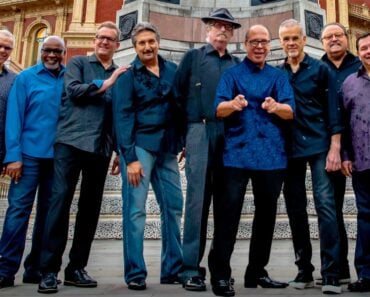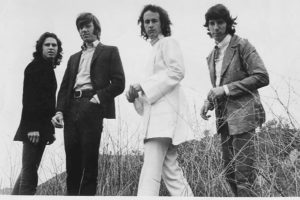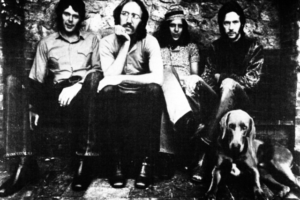In the wake of the breakneck success of Whitesnake (1987), David Coverdale embarked on a journey that would send him to the highest of highs before meeting the lowest of lows.
No one—including David Coverdale—could have predicted the success of Whitesnake’s classic ’87 self-titled affair. Considering Coverdale was 36 years old at the time, going into it, many thought him a dinosaur. But no matter, Whitesnake soared beyond expectations, becoming poster children for all that was glorious in the ’80s.
Just two years later, though, Whitesnake was a runaway train. The band’s creative director, John Sykes, had abandoned ship, and the rest of the lineup had continued to shuffle, too. Making matters worse, Coverdale’s mental state had begun to suffer, with deeper and deeper levels of burnout imprinting themselves on his weary psyche.
Of course, it wasn’t all bad. Coverdale has summoned Ibanez-wielding shredder Steve Vai to the table, and the rest of the Whitesnake cast of characters weren’t too shabby either. And in 1989, yet another titan of a record, Slip of the Tongue (1989), was unleashed, leading to further international success but still more burnout for Coverdale.
By 1990, on the brink of divorce and feeling lost in his own success, Coverdale folded Whitesnake after the supporting tour for Slip of the Tongue wrapped in Japan. Upon returning home, the now 39-year-old vocalist sought quiet and time to reflect. But life had other plans, and as fate would have it, Jimmy Page came calling.
Collaborating with Page was just what the doctor ordered for Coverdale. And as many will remember, the fruits of the oft-nicknamed “Led Snake” project manifested as Coverdale/Page (1993), an album widely considered some of Coverdale’s finest work. Indeed, it seems that Page brought out the best in Coverdale and that heaping doses of blues-laden rock were all the booming frontman needed to center himself once more.
Looking back on one of the more tumultuous turned creative periods of his career, David Coverdale dialed in with ClassicRockHistory.com to dig into reasons behind putting the ‘Snake to bed in 1990, hooking up with Jimmy Page shortly thereafter, and if Coverdale/Page will eventually see the reissue it so badly deserves.
David Coverdale Interview

Feature Photo: Steve Sykes / Shutterstock.com
How difficult was it for you to fold Whitesnake in ’90 at what seemed like a commercial high point?
Coverdale: At the time, it wasn’t difficult at all. I had basically reached a situation where I had no time to reflect on a very long and grueling three- or four-year period. Beginning with the peak of the ’87 record and going into Slip of the Tongue, it was like an express train that just roared past any stop sign thrown its way. And for someone like me, having time to reflect is paramount. But it was just pressure, pressure, pressure to keep this thing going. If I wasn’t doing an interview, I’d be doing a photo shoot. And if I wasn’t doing that, I’d be doing a video shoot or whatever non-stop thing was thrown at me. I got tired.
So, it was a matter of physical and mental burnout?
Coverdale: Precisely. And, of course, things in my private life had gone wrong, too. I was going through what I knew was about to be a messy divorce, which was very unfortunate for all involved. So, it was a situation where I had to stop everything to see what I wanted to do in the future. I had become ridiculously globally successful in that time, but I needed to be happy.
So, after I’d filed for divorce, I told all the band members when we’d finished the last show in Tokyo, “Look, I’m going to have to take some time away. I haven’t told you this, but I’m going to get a divorce, and I think it will be somewhat distracting. So, please don’t be calling me to ask what’s going on with Whitesnake. I need to get myself sorted. I love you all. I wish you every success. And if you get an opportunity, please go for it.” And then, of course, I got home and met my future wife-to-be within three weeks of being home [Laughs]. But I needed the time away regardless.
How did that time away lead to your collaboration with Jimmy Page?
Coverdale: That was sort of an unexpected thing. I had gotten home and had every intention of resting, and then I got a call from Jimmy Page around Christmas in 1990. I remember being tortured over the whole thing because I had been a fan of Jimmy’s dating back to Led Zeppelin, and I knew how amazing of an opportunity it was. And by this time, I had met my wife Cindy [Barker], who has been my absolute partner since, and I confided this all in her. I remember sitting there having coffee with her, and I was a bit worried it was too much, and she said, “David, you’re safe to share this with me.”
That was amazing for me; even 33 years later, that was amazing. It was a turning point for me. I won’t say I dumped all I felt on her, but to feel that it was okay to do so meant a lot. Ultimately, I had to do it; the opportunity was too good to pass up. My wife always says, “You work like you have to.” And that’s true; I’ve never been a greedy guy. I love music, motivating and inspiring people, and being creative.
Was the chemistry between you and Jimmy immediate?
Coverdale: It was. We got on famously. And it was fascinating because I could divert away from much of the stuff I felt about Whitesnake and focus my attention on it. And many people ask if we intentionally created a record that sounds like “Led Snake” or whatever. Honestly, we never chased that scenario. That’s what came naturally, as you’d expect it to. It was amazing for me to write as a 50/50 partner with Jimmy, who I totally respected, and not have to be posturing for whatever would normally come along with Whitesnake. But of course, it would always sound like Whitesnake and Zeppelin. That’s precisely the two creative forces that came together for the project. It was impossible to escape those sounds.
The Coverdale/Page record turned 30 years old in 2023. What’s your viewpoint on the project with hindsight?
Coverdale: Well, Jimmy had some interesting people with him in his life at that time, so I just rolled with the punches. I would have loved to have done more live shows, but just writing with him was so much fucking fun. The funny thing is that before that record, while I’d met Jimmy, I was actually closer to Robert [Plant], believe it or not. I was close with Bonzo [John Bonham], bless him. But I’d met Jimmy several times and expressed my admiration for what he’d done. This was usually at the Rainbow at two o’clock in the morning, but nevertheless, I’d done so [Laughs].
I loved working with Jimmy, and I think that record came out wonderfully. I learned a significant amount by doing so. From the way he set his different amps up to the way he arranged his songs, Jimmy Page is just a remarkable craftsman in the studio. But again, we never specifically sat down and said, “Let’s go and write a ‘Led Snake’ album.” It was more, “If we’re going to do this, let’s get the best out of each other at this time in our lives and careers.” And I feel we did. It was three of the most fulfilling years of my life. Jimmy is a beautiful, kind man. Coming out of a very public scenario to do something more private was glorious.
Considering Coverdale/Page has been out of print for years, are there plans to reissue it?
Coverdale: I can tell you that one heartbreak for me was reissuing the Coverdale/Page album, which is long overdue. Putting things out on vinyl makes it so you must plan very far ahead, which works for me, considering I’m a Virgo [Laughs]. Anyway, I’d found some skullduggery with regard to my relationship with UMG, leading to a settlement. And once that was all happening, I told my lawyers, “Ask for the rights to the Coverdale/Page record; they’re not doing anything with it anyway.”
Well, we ended up getting them. So, I called Jimmy and said, “You’re not going to believe this, dude; we have the rights to the Coverdale/Page record. Can you believe it? Nobody has worked it for years.” He was as excited as I was, so I told him, “What I suggest we do is take all the bootlegs and stuff I’ve got; each provides our own mixes, do a boxset, and reissue this record.” The idea was to have it out for the 30th anniversary this year, but COVID completely derailed it. And now I don’t have the time as it will be a huge undertaking. So, I hope that Jimmy will take it and do it. I entirely trust him to do so.
Feature Photo: Petr Mechkov / Shutterstock.com
David Coverdale Of Whitesnake: The ClassicRockHistory.com Interview
Check out these related articles
Complete List Of Whitesnake Albums And Discography
Top 10 Whitesnake Songs
Revisiting Whitesnake’s Classic 1987 Self-Titled Album
Joel Hoekstra Of Whitesnake: The ClassicRockHistory.com Interview
David Coverdale: The ClassicRockHistory.com Interview article published on Classic RockHistory.com© 2023
Classicrockhistory.com claims ownership of all its original content and Intellectual property under United States Copyright laws and those of all other foreign countries. No one person, business, or organization is allowed to re-publish any of our original content anywhere on the web or in print without our permission. All photos used are either public domain creative commons photos or licensed officially from Shutterstock under license with ClassicRockHistory.com. All photo credits have been placed at the end of the article. Album Cover Photos are affiliate links and the property of Amazon and are stored on the Amazon server. Any theft of our content will be met with swift legal action against the infringing websites.





































